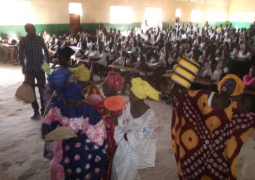The
"Interest on debt consumes about 20 percent of government revenues, mostly in interest on domestic debt," the statement said.
The statement followed a two-week long IMF mission led by David Dunn to assess performance under the seventh review of the
According to the statement, to generate fiscal savings that could be used for other spending priorities such as a possible stepping-up of infrastructure investment under the government's forthcoming Programme for Accelerated Growth and Employment, preparations for the 2011 budget have focused on reducing T-bill yields by minimizing government's domestic financing needs.
"At the same time, strong ongoing efforts to improve budgeting procedures and public financing management would help achieve greater value-for-money from government spending," the statement noted.
The IMF statement stated further that building upon the success of the Ministry of Basic and Secondary Education, which has made excellent progress towards achieving the Millennium Development Goals, the government intends to pilot a medium-term expenditure framework in some line ministries in 2011.
The IMF mission, according to the statement, expects real growth in the
"Also, sectors dependent on tourism and remittances from abroad, which were hit hard by the global economic crisis, are beginning to show signs of recovery. Looking ahead, real GDP growth is projected to remain strong about 5 and half percent in 2011," the mission revealed.
The statement further added that headline inflation edged up to just over 6 percent in recent months, prompting the CBG to raise its rediscount rate by 1 percent point (to 15 percent) in September. The IMF mission expects inflation to decline slightly to 5 percent in the year ahead.
Since June, the IMF noted, performance under the ECF programme has improved considerably.
"In the first half of 2010, severe revenue shortfalls led to an excessive fiscal deficit. The rising cost of fuel imports, in particular, cut sharply into fuel tax revenue, which were squeezed by fixed pump prices," the statement said, adding that the Gambian government took difficult, but appropriate actions with mid-term increases to some fuel prices and by adjusting expenditures in line with a tighter overall resource envelop.
"The rapid expansion of the banking system in recent years is providing much needed financing for the Gambian economy. At the same time, it creates challenges for banking supervision. The mission welcomes the CBG's progress in building its supervisory capacity and its commitment and vigilance to further strengthen the regulatory framework," the IMF stated.
The mission welcomed the Gambian authorities' corrective actions for the missed end-March 2010 performance criterion on the basic fiscal balance, notably by making difficult adjustments to execute a more balanced budget.
Looking ahead, the IMF statement went on, the mission very much encourages the authorities to continue the good performance, which should yield dividends for the budget and for the Gambian economy as a whole.
Meanwhile, the statement was released following a press conference by the IMF mission held at the Ministry of Finance in



